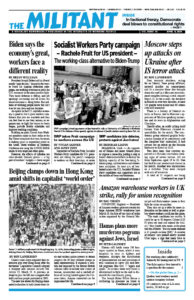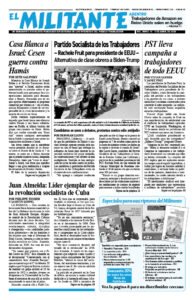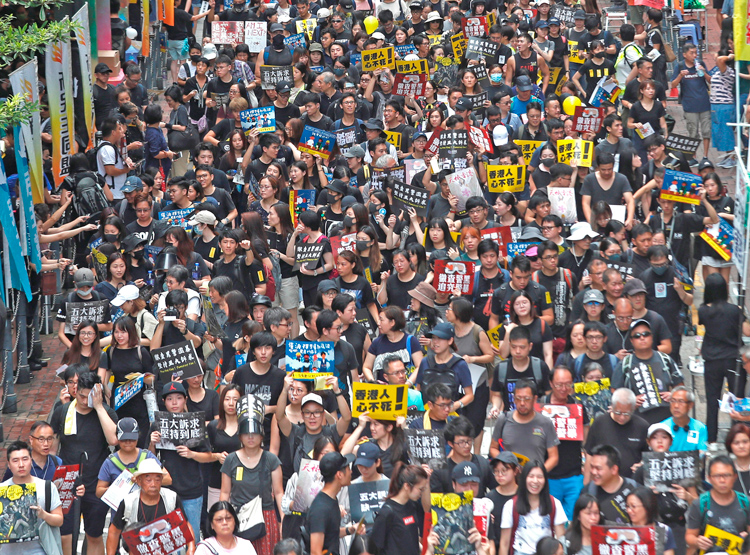China’s rulers have extended their repressive grip over Hong Kong after the territories’ Legislative Council adopted a stringent new national security bill, Article 23, March 19. A previous attempt to pass the bill was scrapped after half a million people protested in 2003.
The new law allows for Beijing-dominated authorities to hold closed-door trials and widens police powers to detain suspects for 16 days without charge or legal representation. It expands a sedition law imposed by the former British colonial rulers to include new crimes of treason, insurrection and a catchall offense of inciting hatred against the Chinese rulers. Anyone convicted can be imprisoned for life.
It allows punitive measures to be imposed on Beijing’s opponents who have fled overseas, including the cancellation of their passports. Reflecting the Chinese rulers’ growing conflicts with Washington and its allies, the law makes collaboration with any “external force” illegal.
“For people of my generation who know what happened back when the U.K. and China were negotiating about the future of Hong Kong, Article 23 is ominous,” Daniel Chan wrote the Militant from Hong Kong March 23.
Hong Kong was promised a degree of autonomy from Beijing for 50 years after the British rulers felt compelled to return the territories to Chinese rule in 1997. The arrangement was supposed to ensure that freedoms denied on the Chinese mainland would continue to exist in Hong Kong during the transition.
But the Chinese government accelerated its crackdown in 2019 “after large-scale demonstrations against Beijing were held in Hong Kong before and after commemorations of the June 4 massacre,” Chan said. He was referring to Beijing’s bloody crushing of the 1989 Tiananmen Square protests by workers and students for political rights in China. Any reference to the massacre is banned on the mainland, but commemorations were held for many years in Hong Kong.
Movement for political freedom
The 2019 actions were part of a broader movement for political freedoms and opposition to Beijing’s interference. For months demonstrations engulfed the city, twice reaching over a million. They forced the Beijing-backed Hong Kong legislature to scrap a hated extradition bill that would have given Chinese authorities the power to try political opponents in courts on the mainland, where they have far fewer rights to defend themselves.
“Today’s Xinjiang is tomorrow’s Hong Kong!” protesters chanted in 2019, referring to Beijing’s repression in China’s western province of Xinjiang. Chinese President Xi Jinping’s regime forced a million Uyghurs and other Turkic Muslim minorities there into “reeducation camps” in an attempt to crush their demands for national rights.
The Hong Kong administration is using Article 23 as “a sword over people’s heads,” Chan wrote. “Many people dare not comment on politics, except maybe when they are home with nobody eavesdropping.”
“Bookstores are closing, shows have been canceled and opposition to the government — once a rallying force — is now mostly whispered,” Elaine Yu and Selina Cheng wrote in the March 21 Wall Street Journal.
The Chinese rulers fear the example that a continuing fight for political rights in Hong Kong would have on workers across China. Toilers there face deteriorating conditions and are looking for ways to defend themselves.
“Xi keeps tightening his control and cracking down on opposition,” Chan wrote. A sweeping national security law in 2020 was used by Hong Kong authorities to try to stifle political opponents.
More than 60 organizations have been forced to disband, including trade unions, media outlets and opposition parties. Dozens, from students and journalists to political figures, have been arrested and tried. Over 1,000 are imprisoned.
Hong Kong’s close links to mainland China — the city’s main attraction for capitalist investors — are now becoming more of a liability, as the growth of China’s state-capitalist economy slows. Hong Kong’s stock market has lost nearly half its value in three years. Dozens of mainland real estate developers have defaulted on bonds issued in Hong Kong, creating huge losses. Tens of thousands of Hong Kong residents have emigrated. Many more say they plan to.
Interest rates have soared in Hong Kong, roughly in line with those in the U.S. The city’s currency is still tightly pegged to the dollar, a policy underpinning its role as a global financial center. But higher U.S. interest rates have impacted Hong Kong’s huge real estate sector, already hit by the collapse of China’s speculative property development bubble.
The Hong Kong government said March 8 that Article 23 is needed because “geopolitics have become increasingly complex, and national security risks remain imminent.”
As Beijing’s economic and military weight has expanded over decades, its rivalry has intensified with Washington, the world’s dominant, if declining, imperialist power. That conflict is sharpening today as the effects of Moscow’s war in Ukraine, Israel’s war to defeat Hamas and a festering global economic crisis ripple worldwide.


